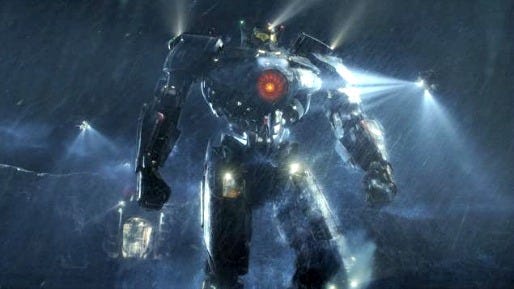Pacific Rim

Robots versus monsters. At its heart, that's what "Pacific Rim" is all about. And yet, this science-fiction thriller is so much more.
Start with the obvious dimension: Size. These creatures who rise from the sea, and the human-controlled metal automatons that confront them, make Godzilla seem like a yappy little dog. Director Guillermo del Toro brilliantly shoots these behemoths so they seem to envelop the screen; the eye can't track all of them at once. We're constantly reminded of their sheer immensity.
At a pivotal juncture, one of the robot guardians, which are called jaegers, picks up an ocean tanker ship and uses it like Casey Jones to wallop one of the toothsome beasties upside the head.
Like I said, big.
But what makes this picture really soar is that del Toro and co-screenwriter Travis Beacham take something old and turn it into something exciting, new and energizing. Essentially what they've done is take two Japanese film genres, kaiju (strange beasts) and mecha (robots), and melded them together.
It's wildly entertaining, a dizzying, dazzling flick. In a summer of sequels, ripoffs and remakes, "Pacific Rim" stands out not just for its elite quality but its original verve.
The setup is that beginning in 2013 (gulp!), these monstrous kaiju start emerging from a portal at the bottom of the Pacific Ocean, laying waste to whole cities and millions of people. All attempts to close the interdimensional pathway fail, but the world's nations pool their resources to build the jaeger (which is German for "hunter") robots to kill them.
"To fight the monsters, we created monsters of our own," we learn.
The robots are so massive, it takes the brains of two people to control one. They're connected in a psychic bond called the Drift, where all thoughts and memories are shared. So the best teams tend to be composed of family members or loved ones.
Cut to 2020, and the jaegers have the kaiju on the run. But then hotshot pilot Raleigh Becket (Charlie Hunnam) and his brother encounter a new type of creature that changes the game.
Jump forward again to 2025, and it looks to be end times for the human race. Global leaders have abandoned the jaeger program to focus on an ineffective seawall strategy, and there are only four of the mechanical giants left to mount a last-ditch effort. Marshal Stacker Pentecost (a commanding Idris Elba), head of the unit, recruits Raleigh to man one of the older jaegers, dubbed Gipsy Danger (which bears a more than passing resemblance to the robot in "The Iron Giant").
Like the jaegers, which were continually improved with each new generation, the kaiju appear to be adapting and evolving — and emerging from the portal more and more frequently. It's an entire bestiary of critters, which are vaguely dinosaur-like but come with a variety of appendages and shapes. The jaeger command gives them appropriate code names, like "Knife Head."
The fight scenes are awesome and epic, taking place both in (and under) sea and on land. They smash through entire buildings like butter, though there is a little of the "Transformers effect," in which it becomes hard to comprehend exactly what's going on when the titans grapple.
There are a couple of key subplots. One involves Mako Mori (Rinko Kikuchi), the Marshal's protégé and wannabe jaeger pilot who is gunning to be Raleigh's partner. The other has to do with Newton Geizler (Charlie Day), a hyperactive kaiju expert who semi-worships them and comes up with some crazy ideas on how to learn their strategy.
Also look for del Toro favorite Ron Perlman as a loathsome but charming black market dealer in kaiju biological trophies. Would you believe the things are so honkin' big, their skin lice are the size of bulldogs?
Ultimately, "Pacific Rim" doesn't add up to more than a fun time — but what a time it is. I don't think there's any movie this year I've enjoyed more.
4.5 Yaps

